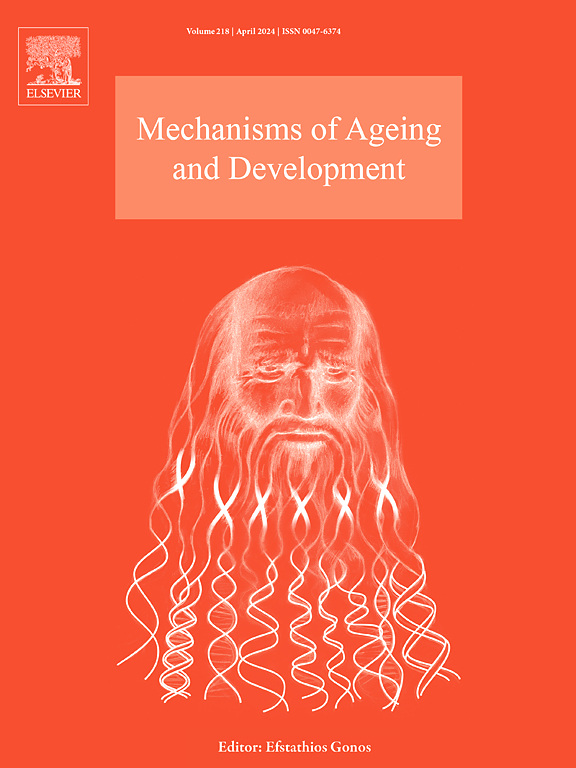The impact of a selective androgen receptor modulator (RAD140) on frailty and underlying mechanisms in older male and female C57Bl/6 mice
IF 5.1
3区 医学
Q2 CELL BIOLOGY
引用次数: 0
Abstract
Background
Androgen receptors (AR) are promising therapeutic targets for mechanisms of aging, including chronic inflammation, lean mass loss, and worsening bone health. We investigated the impact of RAD140, a selective AR modulator that activates ARs, on frailty and underlying mechanisms in older C57BL/6 mice.
Methods
Mice (23.7–25.5 months; N = 21 males; 15 females) received RAD140 (5 mg/kg/day) or placebo (DMSO) daily for 6-weeks. Frailty (clinical and lab-based), body composition, circulating inflammatory markers, grip strength, and genes relating to function/hypertrophy in quadriceps femoris muscles were assessed.
Results
Despite no differences in frailty between treatment and control, there were positive effects in male, but not female mice. RAD140 treated male mice had preserved lean mass (p = 0.024) and bone mineral density (p = 0.004) and lower serum interleukin-6 (p = 0.043) versus controls. In contrast, benefits to body composition and inflammatory markers were not seen in females. In either sex, grip strength, fat mass, and skeletal muscle genes were unaffected.
Conclusion
Six-weeks of RAD140 treatment did not affect frailty in older male or female mice. The beneficial effects in lean mass, bone mineral density, and systemic inflammation warrant longer treatments to explore any positive impact on frailty in males. RAD140 may not be ideal for achieving these in females.
选择性雄激素受体调节剂(RAD140)对老年雄性和雌性C57Bl/6小鼠衰弱的影响及其潜在机制
背景:雄激素受体(AR)是治疗衰老机制的有希望的靶点,包括慢性炎症、瘦体重减少和骨骼健康恶化。我们研究了RAD140(一种激活AR的选择性AR调节剂)对老年C57BL/6小鼠的脆弱性及其潜在机制的影响。方法:小鼠(23.7 ~ 25.5月;n = 21岁男性;15名女性)每天接受RAD140 (5mg/kg/天)或安慰剂(DMSO),持续6周。评估虚弱(临床和实验室基础)、身体组成、循环炎症标志物、握力以及与股四头肌功能/肥厚相关的基因。结果:尽管治疗组和对照组之间的虚弱程度没有差异,但在雄性小鼠中有积极作用,而雌性小鼠则没有。与对照组相比,RAD140处理的雄性小鼠保持了瘦质量(p=0.024)和骨密度(p=0.004),血清白细胞介素-6 (p=0.043)较低。相比之下,在女性身上没有发现对身体成分和炎症标志物的益处。无论男女,握力、脂肪量和骨骼肌基因都没有受到影响。结论:6周的RAD140治疗对老年雄性或雌性小鼠的衰弱没有影响。对瘦体重、骨密度和全身性炎症的有益影响需要更长时间的治疗来探索对男性虚弱的任何积极影响。RAD140可能不适合在雌性中实现这些。
本文章由计算机程序翻译,如有差异,请以英文原文为准。
求助全文
约1分钟内获得全文
求助全文
来源期刊
CiteScore
11.10
自引率
1.90%
发文量
79
审稿时长
32 days
期刊介绍:
Mechanisms of Ageing and Development is a multidisciplinary journal aimed at revealing the molecular, biochemical and biological mechanisms that underlie the processes of aging and development in various species as well as of age-associated diseases. Emphasis is placed on investigations that delineate the contribution of macromolecular damage and cytotoxicity, genetic programs, epigenetics and genetic instability, mitochondrial function, alterations of metabolism and innovative anti-aging approaches. For all of the mentioned studies it is necessary to address the underlying mechanisms.
Mechanisms of Ageing and Development publishes original research, review and mini-review articles. The journal also publishes Special Issues that focus on emerging research areas. Special issues may include all types of articles following peered review. Proposals should be sent directly to the Editor-in-Chief.

 求助内容:
求助内容: 应助结果提醒方式:
应助结果提醒方式:


